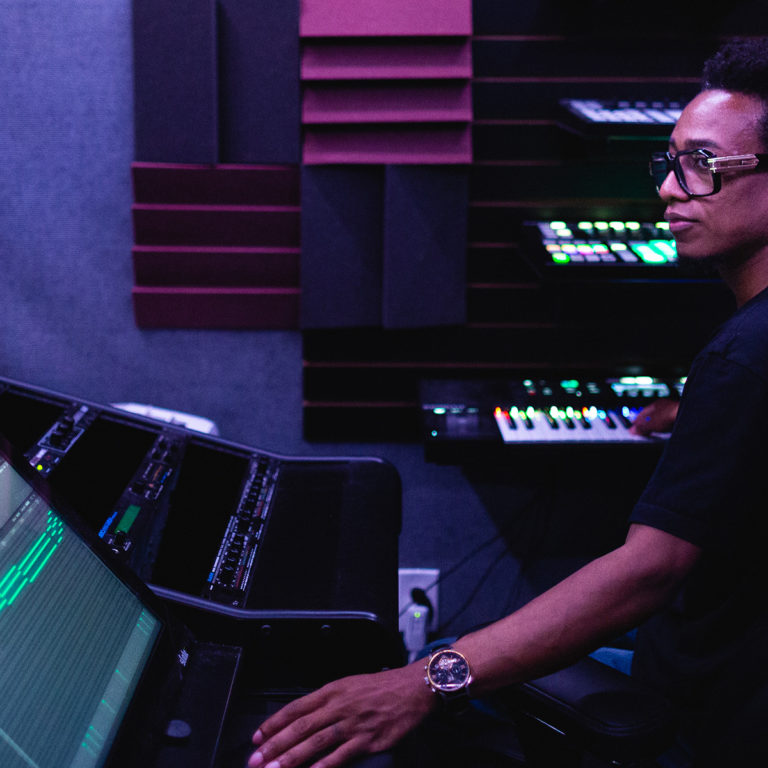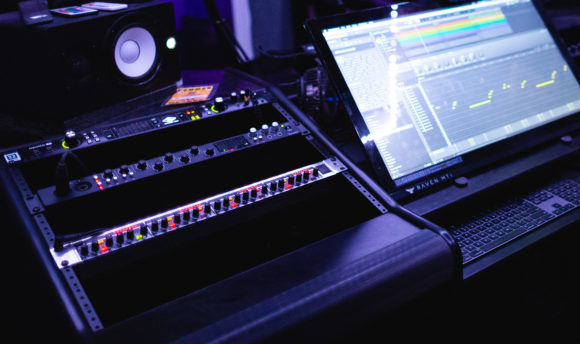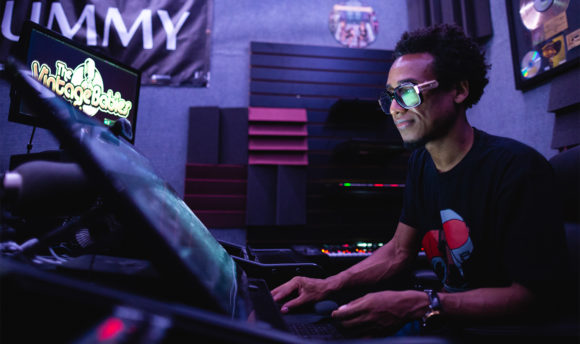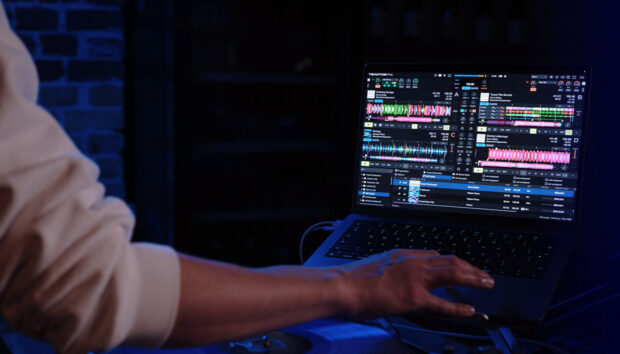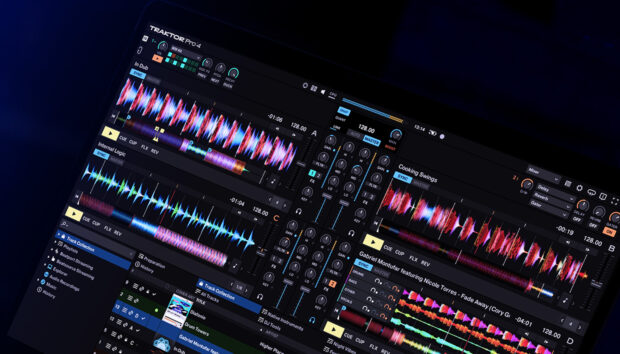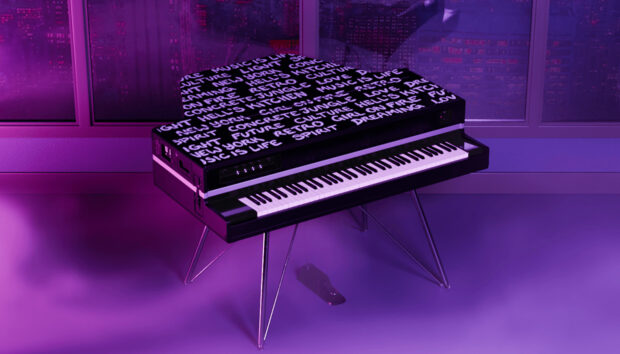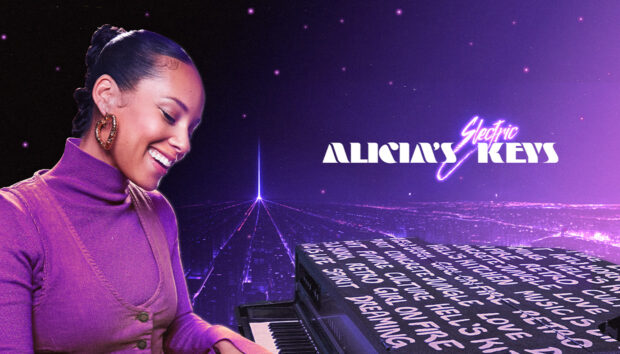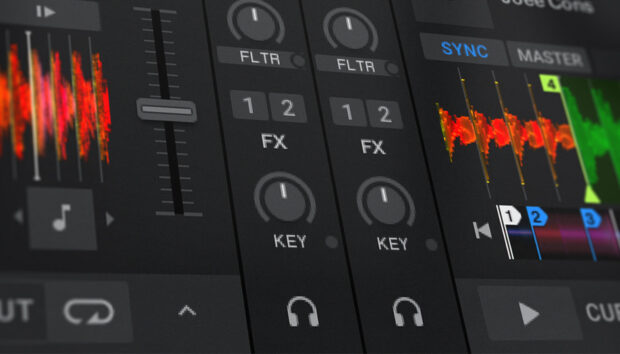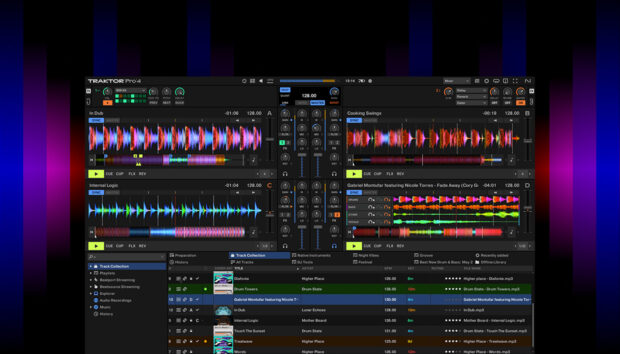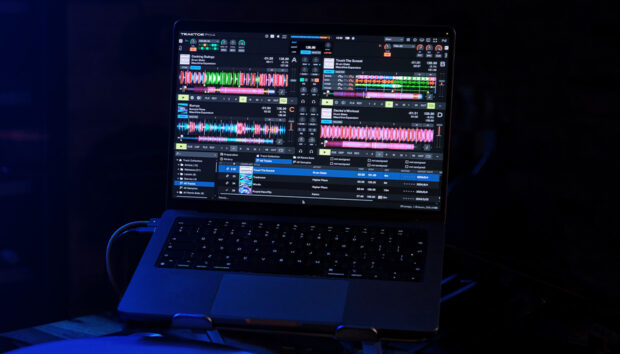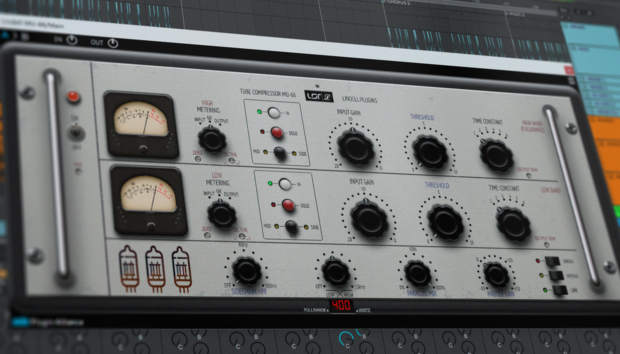Dummy is an unlikely moniker for a musical mastermind, but don’t let the cartoonish name fool you. Over the last 25 years he’s parlayed his turntable skills into a career as a DJ and musical director, performing for superstars like Prince, LeBron James, and Barack Obama, and taking the stage alongside J. Cole, Queen Latifah, Common, Kanye, Alicia Keys, and Mos Def. He’s also one half of the dynamic superduo The Vintage Babies with Grammy-nominated singer, songwriter, and rapper Mumu Fresh. With a CV this loaded, you might be tempted to envision a silver spoon upbringing but his astronomical success comes from surprisingly humble origins.
Dummy started competing professionally at just 14 years old and his success on the battle circuit, breathtaking technical skills, and uncanny ability to work any crowd left a strong impression on the burgeoning hip hop community. To say that he was in the right place at the right time is an almost comic understatement: Growing up in 1980s NYC placed Dummy firmly at the heart of hip-hop’s golden age, leaving the turntable prodigy uniquely situated to witness the genre’s transition from old-school minimalism to new-school innovation and unprecedented mainstream success. In many ways, Dummy’s ascent mirrors that of the art form he’s spent three decades exploring – his star-studded career has taken him from local Brooklyn block parties to sold out shows at Madison Square Garden and the Staples Center.
We caught up with Dummy on his way to a session with Common and discussed creative origins, the evolution of DJ culture, his unique approach to sample chopping, and deep dives on his favorite tracks from his new album, Vintage Babies II: Queen of Culture. Stick around for a track-by-track technical breakdown and a breathtaking bonus story with a Motown legend. As it turns out, you could learn a lot from a Dummy.
How did you get started with music? Were you raised in a musical household?
Well, my father was a DJ. Not professional, just like the family gathering DJ, and he had a great record collection. I grew up in the late ’70s/early ’80s, so hip-hop wasn’t that big, especially not in my household. My father used to play a lot of disco, but his main thing was he was into all kinds of music. So he would play a lot of Led Zeppelin, a lot of Aerosmith, Pink Floyd. So I knew about music in general. And growing up in the streets of Brooklyn, that’s where I was hearing hip hop. So I’m like “I hear these songs outside, but inside my father’s playing these other records.” And my mother only listened to gospel. Maybe a little Motown here and there, but my mother was like, strictly gospel. And my father used to mix disco with Motown and rock. But he was just playing records that he loved, you know? He wasn’t a professional.
I have an older brother who’s also in the industry named DJ LS One, and he’s five years older than me. Every time my father would go out, me and my brother would sneak in and play records, imitating my father, not knowing, “Hey, this is deejaying.” So I started, like, really, really deejaying at the age of seven. My father was doing all the family barbecues, family gatherings or whatever, basement parties, and – you know, we’re talking early ’80s – so they would get drunk and high, and my father would forget all about the music. So me and my brother would go and keep the music going because, you know, nobody’s paying attention to who’s playing the music because everybody’s drunk or having a good time.
Then around ’83, ’84, my cousin – again, he’s not professional – he was a DJ as well, and he was the one that really introduced us to hip-hop and scratching. He’s the one that told us, “Look, what you’re hearing out in the streets right now, this is how you do it. Grab the record and rub it back and forth.” And he was the one that started teaching us that music has to be on count, and that was the beginning of my music.
That’s so organic and family-based. Did you think you’d ever build a career from this?
My father passed back in 2017, and he saw me become successful, so he was very happy. I talked to him a lot and he was like, “I had no idea that this is what was going to be created.” And again, we’re talking the ’70s and ’80s – there were no DJs. That wasn’t a career. It was just something you did. You was on the radio maybe, but I never thought I’d be traveling the world playing two records. In the ’80s, hip-hop was not there yet. It was regional, but it wasn’t that worldwide thing yet. So, you know, around 2010, 2012, my father was just like, “I’m so glad you stuck with this. You took it to where I never would have imagined.”
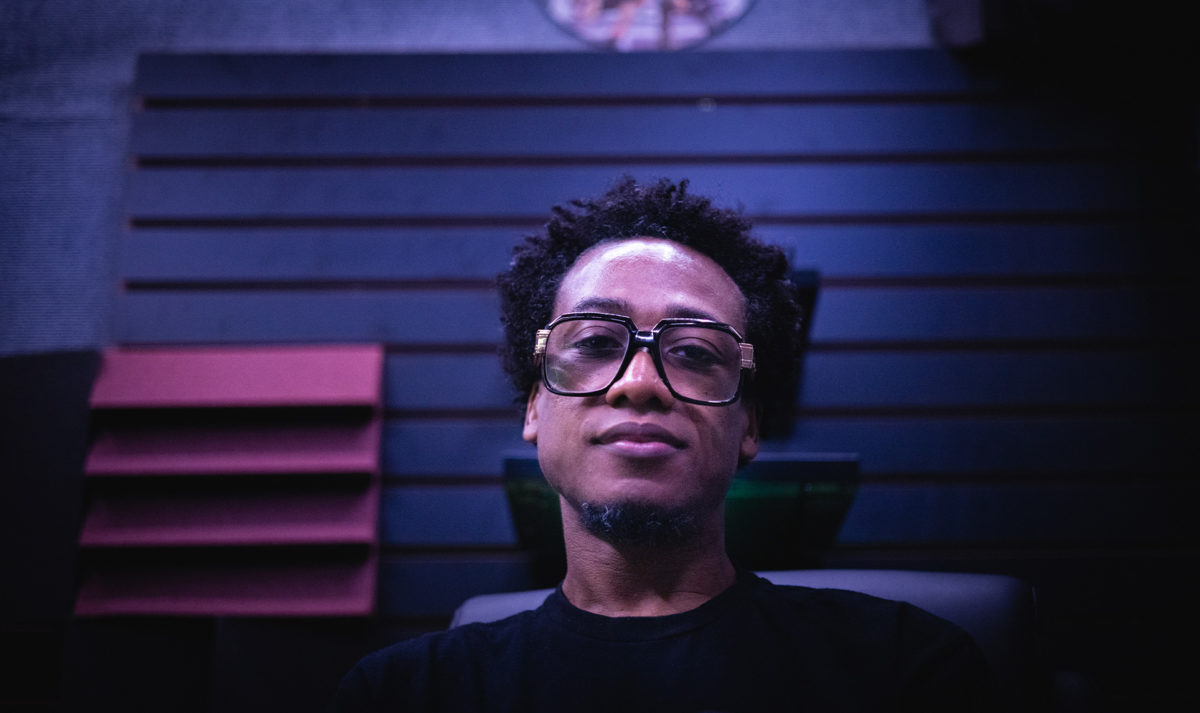
How did you transition from playing family parties to having an actual career as a DJ?
OK, so imma jump to maybe about ’88, ’89. I’m about 11 or 12 years old, and my older brother, is five years older, so he’s about 16 or 17 years old. And growing up in New York – this is why I feel like I’m so blessed to have grown up in New York in the 80s because that’s where, you know, the birth of hip hip hop was really forming – every summer we would have the DJs bring their equipment outside in the parks and just plug into the streetlights and have what was basically block parties. But it wasn’t a block party because there wasn’t no permits! The DJs would take that risk. A lot of times the cops were very cool, like they didn’t bother us. They were like, “They just partying, let them party” but then a fight would break out or whatever and the cops would have to shut everything down.
But so there were local crews everywhere around Brooklyn, around Manhattan, around the Bronx. And me and my brother would go to these street jams and just stand there with our arms folded staring at the DJ and we’d be like, “We’re better than y’all.” Again, we were growing up in the ’80s, so this is the hip-hop mentality. Everybody, even the breakdancers, were battling each other. The rappers were battling. And so we were like, “we’ve gotta battle the deejays.” For maybe three summers in a row, me and my brother would go and stand in front of the DJ and cross our arms and be like “Y’all are very garbage. We are way better than y’all.” And every time they would be like, “If y’all don’t get your little asses out of here…” Again, we was kids. One year in 1990, this guy named DJ Little was like “Alright, stop the music. I’m sick of this. Let them get on right now and if they’re terrible, I want everybody here in the park to boo them!” So my brother goes on and everybody starts screaming, going crazy, and then my brother just stops. He’s like, “You know what? I don’t even want to do it no more. Imma let my little brother do it.” They literally had to get a milk crate for me to stand on top of. I started and the record I was scratching was LL Cool J’s “Rock the Bells.” And everybody went crazy! Even the deejays was like, “Holy cow! All these years we’ve been pushing y’all off!” And they didn’t even have names for us. They were just like, “Oh, those are the two little brother DJs.” That’s how we was known in the neighborhood. And then we started being the ones deejaying at the parties, like around the neighborhoods, doing the house parties and the community parties. It was very local. We was like the local kings and everybody was like, “Oh, those are the two baddest deejays around. They not the most famous, but you don’t wanna mess with them.”
Then we started hearing about these DJ competitions in Manhattan: the New Music Seminar DJ competitions. My brother used to go because he was graduating high school, but I was still in junior high. And my mother would be like, “No, you can’t go because you’re too young,” and I used to be so mad! So my brother would enter the competitions with some really talented DJs, and he’d come back like “I’ve gotta practice. I’ve gotta do this better next year.” Finally, one weekend in 1991, my mother was like, “Okay, as long as it’s on a weekend, you can go.” So my brother took me and I entered the Superman Battle, which was run by DJ Clark Kent. And there were huge DJs as judges: DJ Scratch from EPMD, Pete Rock, DJ Qbert (who was a judge because he’d won the American championship the year before), and Ed Lover and Doctor Dré from Yo! MTV Raps. Every deejay you could think of was there. I didn’t win, and I didn’t do so great. The first round, I did good, and the second round, I actually lost to my brother. I was mad! But at the end of the night, all of those DJs that I just mentioned was like, “Shorty, you’re gonna be something” because I was 12 years old in that competition! To this day, I still speak to a lot of them and whenever I run into them at concerts or events, they’re like, “Man, I remember when you was a little kid” [laughs]. That Superman Battle was when I can say that I entered the industry because they remembered me. First of all, my name was DJ Dummy, and that’s not a name you’re going to forget. But they was impressed by me being that age. A-Trak won as a teenager too, but we’re talking early ’90s and I was one of the first ones to do it.
How does being a live performer shape what you do with production when you actually go into the studio?
Being on stage, doing parties, DJing at the club – I use that same approach when I’m producing because I want that same reaction from the audience. So any artist that I was the musical director for, I put their show together the same way I would do a party. I want that big bang when you walk on stage, which is the highlight of the club, and then I want to take you there. But then I do want to bring you down just a little bit. I want to bring you down so you can go to the bar, get your drink refreshed. But while you’re there, I’m going to throw on this record to make you go “Oh my God, I’ve got to get back in there!” I wanna take you on that rollercoaster, and that’s how I do my production as well.
I make beats from a DJ aspect. Because I’ve toured the world, because I’ve done Top 40 clubs and many DJ lounges where it’s just true hip-hop heads, I know what people are looking for. So if I’m sitting here working with a specific artist and they tell me, “Yo, we need to make this joint to bang in the clubs,” I know the certain sounds like I know certain records. It could be a dope record, but sonically sounds terrible in a club. So the choice of sounds is very important. Today, everybody is heavy with 808 basslines and I’m like, “808 isn’t a bassline!” Like, if you’re playing that record in a lounge, it’s not equipped with subs to carry that record, so it’s going to sound like a busted speaker. So right off the rip, you’ve really got to produce a record to envision, “Where is this record being played at?”
My favorite album, production-wise and the way it was mixed, is Snoop Dogg’s Doggy Style. I’m not saying it’s the best album ever; I’m just saying, mixed and sonically, Doggy Style is the best album. Now, Dr. Dre used a lot of lead sounds in there, which if you’re listening to it at a higher level, that high frequency can really damage your ear. But you can blast this record and it’ll never hurt your ears. It’s all about grabbing the right frequency and grabbing the right lead sound. He did the same thing with “Nuthin’ But A ‘G’ Thang” on The Chronic. I had to learn that as a producer as well.
At that time, there weren’t any in-ears or earbuds, so people didn’t have it as close to their ears and the frequency level wasn’t there. So now when I make beats, I listen to it in three different types of headphones: I listen to it in Beats headphones, I listen to it in a pair of JBLs, and then I listen to it in my Apple buds because the frequencies in those are all different. The Beats are low-end heavy and my JBLs are high-end heavy. If I listen to it and I can’t tell bass notes, then that means I’m producing way too heavy. It just sounds real muddy. Yes, you can fix that in the mixing, but the less mixing you have to do, to me, is the better production choice. Producing is also choosing the right sound before it gets mixed. It’s making the sound work.
So again, I approach this as a DJ and ask myself, “Where is this record being played?” Let’s say I was playing something off of A Tribe Called Quest’s album The Low End Theory. That whole album is very bass-heavy. Now, if I come in and produce something that I want to be played in that realm or that genre of music, I have to compete with that. I can’t just come in with a high-end, tinny song. It’s just not gonna sound right. Or, your song is perfect, but it’ll sound thin compared to another record like that. So when I make beats, I compare them to other records. That’s huge for me. I have to get the right feel first.
That really comes across in the songs on this album. It feels like it’s meant to be played really loud with a bunch of people enjoying it, and not just sitting alone with a pair of headphones.
Here’s a perfect example. I know this is an interview about me, but I love Swizz Beatz. Swizz makes music for everybody to lose their mind to. He makes the greatest community songs. But if you listen to his music in headphones, you don’t get that same feeling. You get that feeling when you’re with other people listening to Swizz’s production. It makes you want to party with somebody else. Now, I’m not saying he can’t do other stuff – I’m saying that he’s great at making those anthem-type songs. It’s the sounds he uses, the very big sounds. And that’s another form of production that people miss. You’ve gotta know where you’re gonna play it, and who you’re playing it for. Now, you play any Swizz song in an arena, and that arena is going to lose its mind because that’s how he makes his music. And I think that’s great.
Every beat I’ve ever made has started from a sample. Whether or not I keep the sample is a different story. I don’t always keep the sample because I usually start adding stuff around it and mimicking the sample; and then I’m like, “I don’t even need the sample to be in there anymore.”
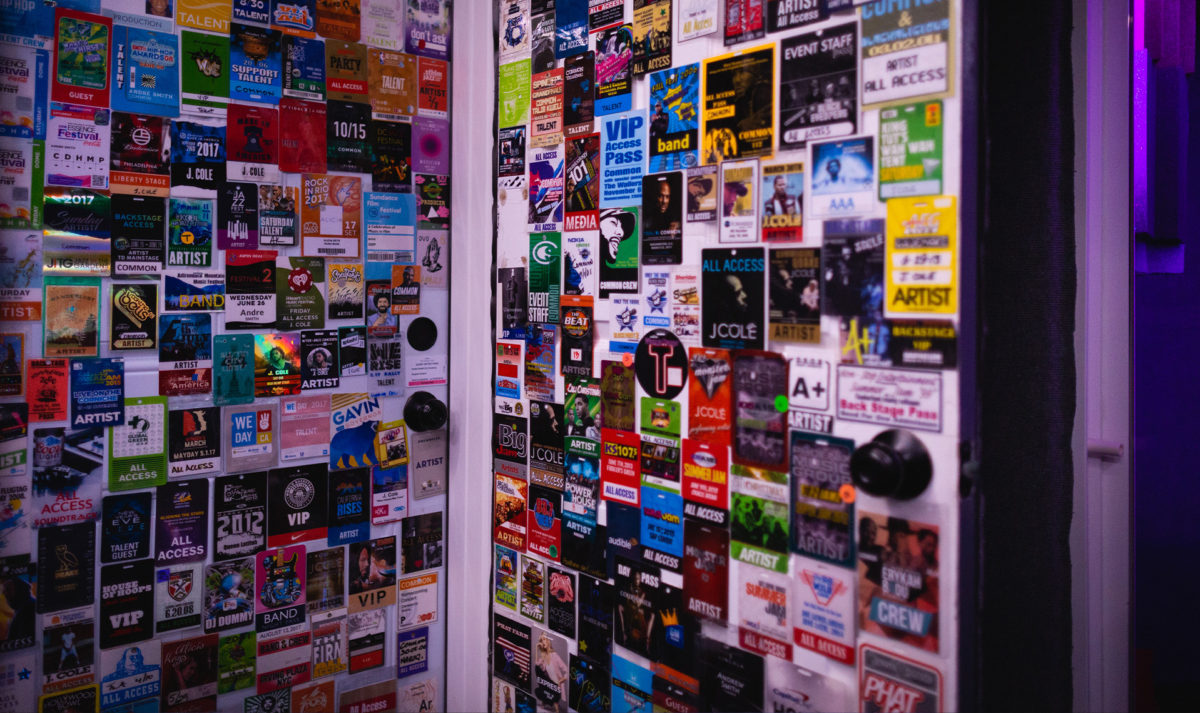
What’s your process for sample chopping? Do you hear something in your head and try to reproduce it with samples?
I search through records and when I hear something I like, I go “Oh my God, that was dope! But it would be so dope if that record did this.” That’s how I build it up. I could never take a loop and just sample a two-bar or four-bar loop. I can’t do that. And I’m not knocking anybody that does, but to me, I don’t feel creativity in that. That’s where I’m like, “I understand why people want to sue you, because you literally just took their loop and slapped some drums on it.” That’s not work to me.
So I will sit down and skim through records. I just put the needle on it, listen, and skip through it like, “Whoa, them strings sounded amazing!” or whatever. And then I just go from there. This is very important for people to know: I never sample records that I don’t like. Every record I have sampled has a meaning behind it, because either “This was something that my father loved,” or “This was something that my mother loved” or “This was something I used to hear in the streets.” I’m not going to just sample a record and have no connection to it.
I was making beats back in ’94, ’95’. And one of my best friends, he would call them “caveman beats,” because everything was just “boom, bap, boom, boom, bap.” And we’d joke about it, but that’s all I knew. I was working on an SP-1200 and an Akai s950, so you only had like 1.2 seconds of sample time, so we had to sample everything on 45 to get the fastest sample time. That’s why my chopping became so good, because I only had 1.2 seconds to sample.
There’s no margin for error.
Yeah. And that’s where my chopping came from. Pete Rock was my idol. I wanted to be Pete Rock so bad! Like everything he did was just genius to me. So I would listen to how he was sampling and I would start mimicking that. And then in ’95, ’96, my brother brought home an MPC and I was like, “Okay, we got a little bit more sample time now!” And the sequencing was just way better than the SP-1200. Now I’m like, “oh you could actually sequence a song!” Whereas I didn’t know how to do none of that on the SP-1200, so now I’m understanding, “Okay, there’s an intro, there’s a verse. You can make changes.”
Then my brother introduced me to Group Home and I became their DJ, and their producer was DJ Premier. So I got to go meet Premier before we went on tour because he wanted to give me all the instrumentals to everything, and I saw that he had the MPC60 and I was like, “Holy cow, he’s using the same thing that I’m using!” So now I started picking his brain like “Premier, how’d you do this?” He was the first one that I saw really work that MPC60. Then in ’97, I met a rapper named Smoothe da Hustler, and their producer was D/R Period. I go to his studio and he’s using the MCP62 as well. But he was playing the MPC as a drummer would play it, and that’s what started changing my drum patterns from the caveman beats. Like “Why do you have to have a garbage pan-sounding snare? Why not use a rimshot? There’s other snares! You don’t have to use ‘Impeach the President’ all the time!” A lot of people don’t know who D/R Period is, but even on M.O.P.’s “Ante Up” (which was much later) he does fills as a drummer. And I was like, “It’s starting to make sense to me now. It’s not just banging on the pads on the one and two. You’ve gotta double up on the snare and add drum fills.”
So fast forward to where I first got on MASCHINE…The reason why I chose MASCHINE is because it was closest to the MPC. The pads were big and it still gave me that same feel. Yes, it was all software now, but it made my job much easier because I wasn’t using any other software. All my beats were being made strictly on MASCHINE. No KONTAKT, no nothin’. I was just straight sampling into MASCHINE, so I was able to keep that MPC feel, but I’d never been able to stretch the sample like that and I had plugins now, which took it to another level. I would do stuff like I was holding a note repeat, and I would do it live and freehand instead because I was learning to play as a drummer would play. And that’s what started changing my whole sound and whole feel of production.
Let’s talk about your new album, Vintage Babies II: Queen of Culture. As a DJ, you come from a live performance background and throughout this whole pandemic, you couldn’t perform live. So what was it like writing this record?
Honestly, this album started in November 2019, pre-pandemic. And then the pandemic came in March and shut everything down but the album was done! So it gave us the time to sit with the songs and go “You know what, let’s add this. Let’s change this.” We was at home doing nothing, and we didn’t want to put an album out at that time because of the way that everybody was feeling. It just wasn’t fair to people. Mumu was like “these songs is supposed to charge people, but don’t nobody feel like being charged. We don’t have that energy. That’s not the energy we want to put out to the world because everybody’s kind of depressed right now. Not only do we have to be sensitive to people, but we don’t feel that way either. We’re in that same boat, too.”
And not putting it out, Mumu kept writing and I kept making new tracks. And then July or August, the pandemic was just so depressing, it was really bad. We was locked in for the summer, and Mumu Fresh was like, “I need to get stuff off my chest because none of us have ever lived like this before.” So she kept writing more songs and I would send her music. And then she was like, “I’m coming back to L.A. I gotta get back in the studio again.” Again, we wasn’t planning to change the album – we was just like, “Okay, we just got to keep recording it so we have a nice library of music.” But when she got out here and we started recording, I was like, “Oh, my God, these songs are amazing!” I would say maybe three of the songs on this album were on the original album.
So the album was definitely pushed back, which gave us more songs, and gave me more time to learn more production tricks. The way that you hear the album now was not how we recorded the songs. I just went back and started adding and changing things. It just happened that way. And that was a great thing. I’m never gonna say the pandemic was a blessing. But because of the pandemic, we made a better project.
Would you say that’s the biggest risk you took on this record?
To keep it sounding authentic, yes. That’s the most important thing to me, because I know so many musicians, I don’t want them to be like, “Oh my God, this sounds like it was played on the keyboard.” I can’t have that right now. I want it to feel natural.
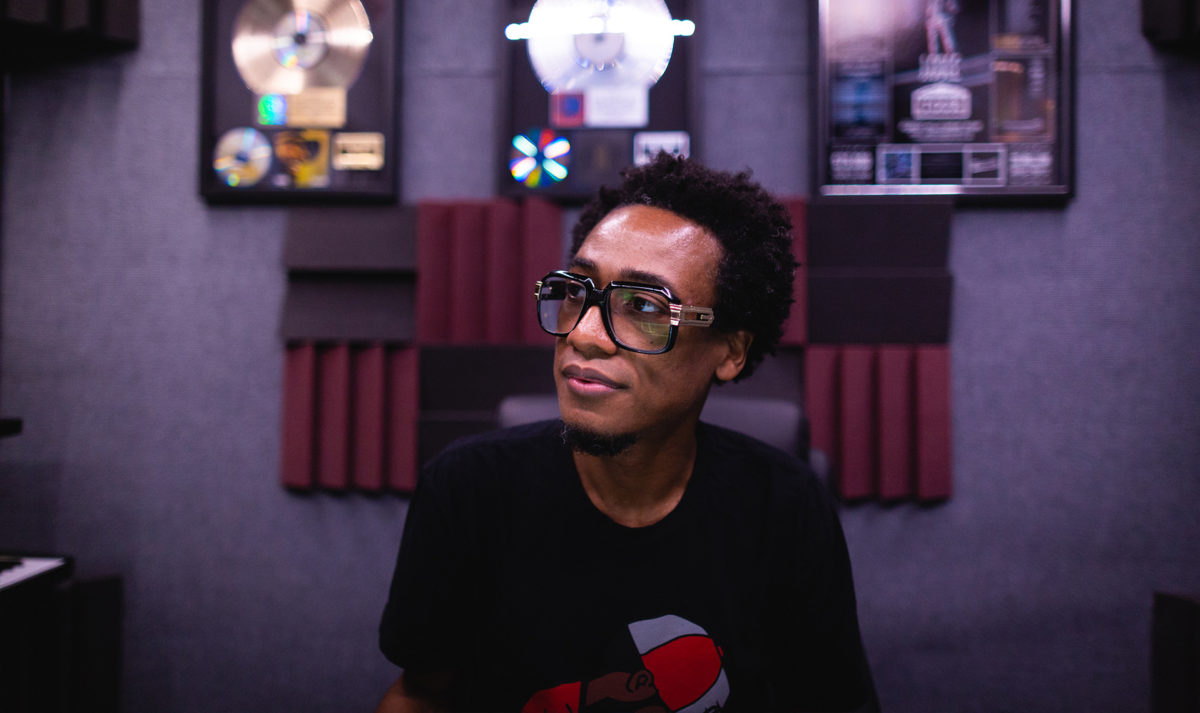
You’ve also worked as musical director for Common, Queen Latifah, Alicia Keys, and more. What’s your approach to live performances?
From deejaying to being on stage and production, I just basically use the same thing all the time. I take my production skills and use them to make the show go. My whole setup is all Native Instruments, from MASCHINE to the F1 to the Z2 to Traktor. Working with Alicia Keys, I was drumming using the MASCHINE and that was the most fun thing. I had a whole Traktor setup and I’m also playing the tracks, and sometimes she’d be like “Break it down, because I wanna do it acoustically,” and I could take out the drums and just add finger snaps, just hitting the MASCHINE on the side; then I could add an 808 if it just needed an 808 in there. I did it with J Cole. I did it with Common. And I’ve never seen nobody doing what I was doing.
Last question: Any cool stories from the road?
A lot of them I just can’t say [laughs] but here’s one: I was the opening act for Rihanna on her Loud Tour. CeeLo Green was the opener, but he had to drop out. So I was her opening act, and everybody lookin’ at it like, “Who is D.J. Dummy? I ain’t payin’ no money to see DJ Dummy!” But I killed it every night. Just straight DJing for 30 minutes, and every night when they left, they was like, “Holy cow!” And again, that was understanding how to be a DJ, and I owe that to my father. Because I was there as J. Cole’s DJ, and I understood that Rihanna’s crowd is not J. Cole’s crowd. I had to cater to Rihanna’s crowd, so I played a lot of ’80s music; then I would jump around to White Stripes and Nirvana, then I’d turn around and play Drake. I took care of everybody. I didn’t leave anybody out. And then I would end it with a Prince and Michael Jackson set, and they would just lose it.
So one night, we was in Anaheim at the Toyota Center and after the show, I get in the elevator and Stevie Wonder gets in the elevator. And the lady that was with him, she was like “You was the DJ that was at the beginning of the show, right?” and I was like, “Yeah.” And he reached over to put his hand on my shoulder and was like, “I have never heard anybody have an audience scream so much playing records.” And I’m standing there like “This is freaking Stevie Wonder!” and he was just like “Man, you did an amazing job.” So when Stevie said that, that’s the wildest thing for me that I could ever tell. And every time I go to that Toyota center, I just think, “Man, I was in the elevator with Stevie Wonder and he said I did a great job.” Then I’m like, “Why was Stevie Wonder at a Rihanna and J. Cole concert?!?” [laughs] But hey, that’s what it was.
We also asked DJ Dummy to talk us through some tracks from his new Vintage Babies album and how they were made using Native Instruments gear. Read on below.
Mumu Fresh feat. D Smoke “North Star”
“North Star” was a Brazilian jazz record that I sampled. That part that I took wasn’t a straight 4/4 count. It was a 3/4 count. So to make that beat, it sounds like a straight jazz record. Then once I added the drums to it, I played the bassline. And again, I’m not a musician! So thanks to Native Instruments, that Komplete Kontrol with the light-up keys helped me to play the right notes. I was in the right key, so I knew which notes to play; but playing those keys as if I was playing an upright bass…like, I spent hours and hours trying to be good because I love jazz music so much and I know a lot of jazz musicians. So I don’t want them to be like, “Damn Dummy, why you not callin’ me to play that?” because the sound is so bad.
So I was really like, “I’ve gotta get this sound right!” I was trying to mimic a jazz 3/4 count on the key bass and I had to play the piano on top of it as well. Then I got one of my good friends – Keyon Harold, one of the great jazz trumpet players – to play the horns on it. Then, for Mumu, I was like “How is she going to rap on this?” because it’s 3/4. And her and D Smoke sat down in the studio together and they came up with the flow and the pattern of it, and once they got that, that was it.
NI products used: MASCHINE, KOMPLETE KONTROL S49, REAKTOR (Lazerbass and Simple and Fine Bass for bass, SPARK Delucky for sitar, Sound School Analog-Gittar for guitar, Subharmonic Book Of Genesis synth, Prism Chimelion bells, KONTAKT The Gentleman piano and Orchestral Solo Strings and Trumpet Ensemble).
Mumu Fresh “Find a Way”
The other song I mentioned, “Find A Way” featuring Amber Navran, I think that’s where I used the most Native Instruments stuff ever: Komplete, Massive, Reaktor, Kontakt, everything. I love the chords, and the drum pattern is actually one of the Marble Rims Expansion pack drum patterns. I didn’t just use it – I broke it up, I separated everything, and kind of placed the drum pattern where I wanted it and added my live drum feel. Then I had to play the bass. I had to play the keys. I had to play the violins. But using Native Instruments stuff, it sounds so authentic. It was really, really great.
When Mumu heard that track, she was like “This is a perfect song.” She don’t just rap to rap. Everything she does is a concept, and she was like, “I’ve got this concept, and this track right here has the right vibe for it.” And once we got Amber to join it, it was just a perfect track. So that was the most difficult. Because again, I was afraid of like, “Am I playing the right chords?” Is other musicians gonna be like, “Yo, those are cheesy chords”? I ain’t gonna say I was self-conscious, but I was very concerned. So I let a lot of my other musician friends listen to it, and they were like “Man, you did it on this one.”
NI products used: MASCHINE, KOMPLETE KONTROL S49, EXPANSION: MARBLE RIMS (Drums), REAKTOR (Photone – The Jazzer – Bass), FM8 (Electric Harp), KONTAKT (Orchestral – French Horns Ensemble, Violin Ensemble).
Mumu Fresh “Rap God”
The most complicated song overall was “Rap God.” That drum pattern is also from a Native Instruments Expansion, but that beat was 117 bpm and I slowed it down to 58.5 bpm. I have it at half-time, and that’s what gave it that stretched, grainy sound. It’s really the drums driving that track with that gritty, metallic sound. Then my partner Trey mixed the song, and after he mixed it, I was like “Something’s still missing.” It sounded great, but the kick just wasn’t hard enough, so I found another kick and doubled it up on top of that. I didn’t want a subby kick, I wanted a punchy kick – somewhere in the 100, 200 frequency – so that you’re feeling it almost like a gunshot. Once we added that we were like, “Now this record’s ready.” We sat with that record a long time. A very long time.
NI products used: MASCHINE, KOMPLETE KONTROL S49, EXPANSION: BLACK ARC (Drums).
Mumu Fresh “Work”
So this is the first time I’ve ever done this but Mumu sent me the lyrics first and she was like “I need you to make a beat to this.” All she did was send me a metronome and she rapped to the metronome. So I listened to it and I heard guys working. I wasn’t necessarily thinking of a chain gang, but I wanted it to represent a struggle. And I did this beat maybe back in 2002, but it sounds nothing like it sounds today. So when I heard her rap, I was like “Oh my god, what if I bring that old beat back?”
The theme we’re going with on this album is that we want to cover everything musically. That’s why we have a jazz record, a gospel record, a reggae record, a James Brown soul record. So I’m like, “We need that caveman beats hip-hop record!” So I went through some old hip-hop records, and I didn’t sample drums but I was listening to those old school hip-hop drums because that feel makes you wanna rock back and forth all day, and that was the feel I was getting from her lyrically. So I was like, “Okay, lemme match that.” So all the drums on this track are Native Instrument drums. There are no sampled drums on this. I started with the bassline and, again, I’m not a big fan of 808s. I’m just not. I think it takes away, especially live. I produce ahead. I think about how it’s gonna be played, how it’s gonna be performed. So where’s the 808 on stage? Who’s playing the 808? There’s no 808 player! You have a bass player! So I try to make my bass as subby as an 808 can get, but so a bass player can still play it without losing that feel. I have used 808s, I’m not denying that, but as a bassline, I just can’t do it.
Then I was like, “You know what? I’m gonna let the drums drive this track more than the bassline.” And that snare was snappin’ so hard, so I added the arpeggiated Kontakt Session Strings and when the song was done, Mumu came and re-did her vocals. It made me feel like Run-DMC’s “Rock Box” and what’s so dope about that record is the guitar solo at the end. So I called my guy Showcase and I was like, “Listen to this song. I’m not telling you what to play. I want you to just add to it.” So he played over the whole song and sent me like six different takes, and I just chopped them up and pieced them all together. Then I placed them mostly in the second verse where it wouldn’t cut off her punchlines or anything because it’s always in between. Then at the end, I just let him go by himself, like “End it out for us,” and that gave me that “Rock Box” feel without losing the integrity of that boom-bap hip-hop.
NI products used: MASCHINE, KOMPLETE KONTROL S49, KONTAKT (Session Strings Pro-Section 3 and 4 Ensemble Animator), RAZOR (Plumber Bass).








